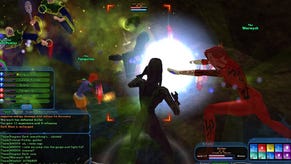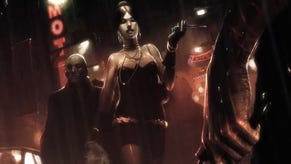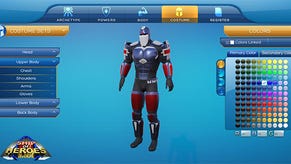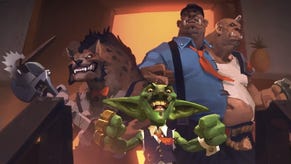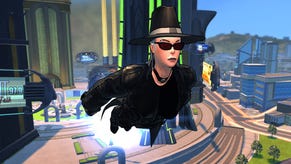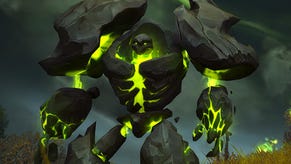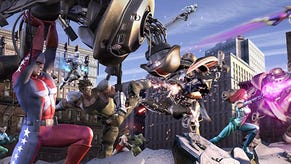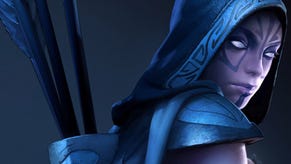Behind The Scenes On City of Heroes
Following on from our recent Hinterland diary, we now yield RPS' floor to another agreeably garrulous developer. This time it's NCSoft's Bruce Harlick, who's Senior Game Designer on City of Heroes/Villains. Below, he writes about the process of designing lore and missions for the splendid superheroic MMO, the drawing board stories behind the upcoming Issue 13 update and a ghost named Sybil. Off you go, Bruce.
City of Heroes, Issue 13: Power and Responsibility
Designing the New Missions – by Senior Game Designer Bruce Harlick
One of the things our players are most interested in is how we go about the process of designing the missions and story arcs they play through so much. It’s not just an easy process of throwing together some pre-created maps, plopping down some enemies to get rid of, and setting up the appropriate rewards. We carefully consider the plot of the missions or story arcs and their flow in the gameplay sense, what resources we can (or can’t) use to achieve our goals, carefully balance difficulty with rewards, and consider how to creatively get the best out of what we are typically able to use to make the entire encounter much more interesting. You can best get a sense of how we do this, from the bottom up, with the new Cimerora and Midnight Squad story arcs.
The Cimerora arcs came about as a way to help me learn the mission writing tools shortly after I started working on City of Heroes/City of Villains. Joe Morrissey, the Lead Mission Writer, provided the core of the idea for the first hero and villain arcs and asked me to run with it, to step me through the development process. I was given the mandate of no new assets or code for these arcs. We spent some time kicking the idea around. The idea of using Daedalus as a new hero contact came pretty naturally; he’s a neat character and would be the kind of guy who’d ask a hero to help him get out of a tough situation. Joe mentioned that Jay Doherty had done up a version of Ghost Widow as a Sibyl, and that was the genesis for a new villain contact, the “Ghost Sibyl.”
The villain story arc was intended to be a mirror of the hero story arc. Since I was playing with time travel, it was fairly easy to justify either side of the story “winning.” But as I began to create the Ghost Sibyl contact and write the villain missions, I began to wonder at her motivations for these actions. Was she just mad at Daedalus? Or did she have some deeper motivations? I had discussions with Joe, Matt Miller, and other lore keepers as I went to flesh out her back story, which led me to the connection between this outcast Sibyl and Ghost Widow. Thus was Sister Airlia born. (Airlia comes from the Greek and means “ethereal,” which I thought was appropriate for her character.)
Creating these two story arcs in our mission tool taught me a lot about the system and time went very quickly. I completely overlooked the fact that both of the arcs sent the teams out of Cimerora, which would have bad repercussions on any co-op teams on these arcs. Teams travelling to the Rikti War Zone (the initial destination of the second mission of the arcs) would break when they left Cimerora and have to reform upon arriving in RWZ. So these missions became faction-limited, even though they were given out in a co-op zone. That, of course, required some technical magic from programmer Vince D’Amelio. So much for the “no new assets or code” thing.
Once the missions became hero- or villain-only missions, there was no real need to send the characters to a place as far away as the RWZ. So I relocated them to zones a little more appropriate for characters on the lower end of the allowed level range. As a side note, writing missions for a large level spread, such as the 35 to 50 range of these two, is fairly challenging. You have to make sure you are using groups and bosses that will scale properly over that range, and you also have to make sure that the zone content is challenging but do-able for a wide level range. In the end, you err on the side of making sure that the bottom of the range can complete all of the mission tasks, even if it makes it a bit easier for the characters at the top end of the range.
I finished the first draft of these arcs before we had our kick-off meeting to discuss implementing them, so I went to work on doing another arc with Sister Airlia, to dig a little deeper into her story. I also wanted to do something else with Daedalus. I discussed the ideas with Joe and Matt, made some modifications and wrote them up. This time, I wanted to get a little more ambitious in what I was attempting to do. I also wanted to get a couple of outdoor mission maps for Cimerora. Ken, our art director, had encouraged me to ask if I wanted to try to get new art assets and I took him at his word, requesting two IOMs (Instanced Outdoor Maps) pulled from areas we were using in the Imperious Task Force. Ken was awesome and got the requests on the schedule and I had a larger playing field to use in Cimerora.
The second Sister Airlia arc went a little more into her background and had her using the players to help her set up a political power base in Cimerora, to try to circumvent her mysterious curse. The first mission has the player bringing someone back from the future and helping that NPC to infiltrate the Sibyls. During the kick-off meeting, Vince and I discussed how to get the character from the future to change into Cimeroran-appropriate garb, and he came up with the concept of the “Sibyl hut.” It took a little code wizardry and a lot of me banging my head on AI behaviour, but we ended up with a pretty neat sequence there.
The third mission let me use Darren Wade; it’s always fun to visit established characters and write stuff for them. You need to get your head into their character voice and attitude, and Wade’s just a fun guy to write. I wanted to get some kind of visual effect for the last part of the last mission in the arc, but since this was really supposed to be a tutorial for me to learn the system, we didn’t have the art or code bandwidth to do it. In the end I think the mission still works without it.
Since Daedalus is the Cimeroran version of Positron and the greatest craftsman of his age, I wanted his second arc to feature some sort of crafting or item creation. So the first act has the hero investigating a threat, the second act sends the hero to create a device to help protect Cimerora from the threat, and the final act lets the hero protect Cimerora while Daedalus employs the device to prevent the threat from reoccurring. In the second mission, the “crafting mission,” I delved deeper into our dialog tree system and had a lot of fun writing the Crey Energy Fabricator Mk I. Although it is only a machine, I could hear its voice and get a sense for its personality as I wrote its dialog. I think the sequence there works better than a “get the salvage and go to an invention table” type of crafting mission.
All four of the arcs went through changes and got tighter during the team play-test and closed beta test period. I think they became much more focussed and better as a result of all of the feedback. It was a pleasure to be able to contribute to the rich background of City of Heroes/City of Villains and I’m looking forward exploring the connection between Ghost Widow and Sister Airlia in future story arcs. Until then, I hope you all enjoy the new Cimerora content...




